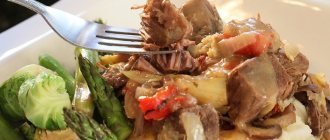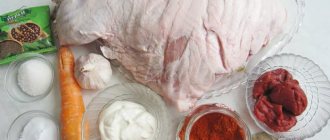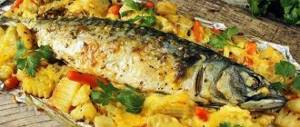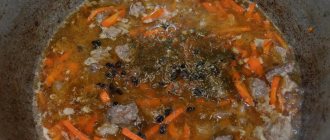Korean asparagus and carrot salad recipe
- Cooking time required: 3-5 hours for the asparagus to swell.
- Kitchen utensils and appliances: 2 bowls, cutting board, spoon, knife, sieve, frying pan, garlic grater, Korean carrot grater, stove.
List of ingredients
| Soy dried asparagus. | 250 g |
| Onion | 1 PC. |
| Garlic | 5 cloves |
| Vinegar 9% or acetic acid | 1 tbsp. l. or 0.5 tbsp. l. |
| Carrot | 1 PC. |
| Coriander | 1 tsp. |
| Vegetable oil | 3-4 tbsp. l. |
| Black pepper | 1/3 tsp. |
| Salt | taste |
| Red pepper | 1/3 tsp. |
Step by step recipe
- To begin, soak 250 g of soy asparagus in cold water for 3-5 hours. Taste it periodically; it should remain slightly rubbery.
- After a while, rinse it under cold water. The easiest way to do this is with a sieve.
- First cut the softened asparagus in half, and then each piece into thin slices.
- Peel 1 onion and cut it into small squares.
- Wash under running water and peel 1 carrot. We grate it to prepare Korean carrots.
- Pour 3-4 tbsp into the pan. l. vegetable oil and set to heat on fire.
- As soon as it warms up, add chopped onion.
- We continue to fry it until a light golden hue appears.
- Combine chopped asparagus, fried onions and remaining oil after frying in a convenient bowl.
- Place the grated carrots in a bowl.
- Add spices: 1 tsp. coriander and 1/3 tsp. ground red and black pepper.
- We fill everything with 1/2 tbsp. l. acetic acid or 1 tbsp. l. regular 9% vinegar.
- Add salt to taste.
- Peel 5 cloves of garlic and grate them or pass them through a garlic press.
- Mix everything thoroughly and let it brew for a while. Place the finished dish on a serving plate!
Beneficial properties of soy asparagus
Despite the relatively high calorie content of the product ( 440 kilocalories per 100 grams ), asparagus contains vegetable protein , which is completely absorbed in the human body. It is useful for diabetics and allergy sufferers - it does not contain cholesterol and lactose.
Athletes and vegetarians consume this product because of the vegetable protein it contains. In addition, asparagus is known for its medicinal properties, some of which, according to legend, were noted by the Chinese Emperor:
- The presence of lecithin has a beneficial effect on the absorption and metabolism of fats, slows down the accumulation of fat in the liver, and accelerates its breakdown.
- Has choleretic and diuretic functions.
- Relief of menopausal symptoms.
- It is a preventive measure in the treatment or prevention of prostate diseases.
- The amino acid content helps cleanse the body of toxins.
- Prevention of cancer.
- The risk of developing atherosclerosis is reduced.
- It is a rejuvenating agent.
- Prevents the development of cancer cells in the mammary glands.
- Helps normalize the body's hormonal levels.
- Prevents the occurrence of stroke, reduces the risk of diseases of the cardiovascular system.
Most anti-aging and preventive agents are explained by the presence of phytohormones and vitamins B (1,2,5,6,9,12), C, A in the soy product.
Other cooking options
I always wonder if in Korea they cook carrots the Korean way. Unfortunately, I was not able to check this personally, but the Internet says that this dish is typical only for immigrants from the Soviet Union. Since, taking as a basis the recipe for kimchi, which was based on a combination of Chinese cabbage, carrots and marinade, immigrants from Korea began to prepare something similar here. However, at that time it was not possible to get Chinese cabbage, so they replaced it with regular cabbage. But over time, carrots took root more and replaced all the other ingredients in this recipe.
In fairness, it is worth noting that Korean-style cabbage has become a separate dish and is also often found on our tables. In addition, the use of original dressing and marinade in this cuisine is typical for preparing not only vegetables, but also meat and fish dishes. So, for example, if you love seafood, cook Korean-style squid. Well, or as a last resort, you can always make herring in Korean. The finished last dish can be used both for making sandwiches and as an independent dish on the holiday table.
If you like spicy food, then you will like Korean kuksi. It is often compared to Russian okroshka. Indeed, there are some similarities, however, to know for sure, you need to try it.
As you can see, the recipes are quite simple and do not require any special cooking skills . Many housewives like to add various sauces to such dishes. Such as narsharab or soybean. Try to prepare such a dish, and write the results or additions to my recipe in the comments on the website. Bon appetit!
Soybean asparagus, or “fuju” in Chinese
Soy asparagus is a product that has recently become popular in the line of semi-finished products. The real name is not correct because this product is not a vegetable and has nothing to do with the asparagus family. Soy asparagus, or “fuzhu” (original name in Chinese), is a derivative delicacy obtained by specially processing soy milk. The resulting dried leaves are stored in a usable form for one year. Fuzhu has a pleasant taste and is used in cooking in various dishes.
Asparagus during pregnancy
As mentioned earlier, asparagus is not prohibited during pregnancy, often it is even specially introduced into the diet of a pregnant woman, this is due to the fact that the delicacy contains a large amount of folic acid, and this, in turn, has a beneficial effect on the process of fetal formation.
Can pregnant women eat asparagus? Yes, you can, but everything is good in moderation, especially during pregnancy, so this product must be used carefully and in moderation.
Asparagus during pregnancy has a positive effect on both the expectant mother and her baby, because the product is rich in vitamins and minerals, which a woman so often lacks during pregnancy.
To enjoy asparagus, look for those that are bright green in color. You will love the crunchy taste of fresh vegetables.
Here are the nutritional benefits of eating asparagus during pregnancy, making them ideal for a pregnancy diet:
- Asparagus is rich in vitamins and vitamin minerals. About 100 g of asparagus contains 24 calories.
- It is a rich source of vitamin B9, B complex, K, C and A. Vitamin B9 helps prevent birth defects like cleft bafida in your pregnancy. You can get your daily dose of vitamins with regular consumption of asparagus.
- Asparagus is considered a great addition to your pregnancy diet for folic acid. Folic acid or folic acid helps your fetus develop properly and reduces the chance of birth defects.
- The calcium contained in asparagus helps in the development of teeth and bones of the growing baby inside you.
- The vegetable is rich in fiber, which combats laurel problems such as constipation.
- Asparagus is known to promote fertility. This can be a very good option for those trying to get pregnant.
- The diuretic effect of asparagus detoxifies your body. It eliminates all toxins from the body and cleanses the stomach system. This improves digestion and metabolism.
Asparagine (a natural amino acid, a protein component) contained in the plant dilates blood vessels, thereby reducing blood pressure and protecting the heart from overload. The same substance can bind toxic ammonia formed in the body.
Folic acid, which is also abundant in asparagus, is needed by both pregnant and nursing mothers. It reduces the risk of birth defects in a child, but, unfortunately, is almost not produced by the body. The vast majority of women suffer from folic acid deficiency. Doctors are often forced to prescribe this vitamin in tablets to expectant mothers.
A large amount of coarse fiber stimulates digestion and helps remove toxins. Magnesium relieves fatigue. B vitamins are beneficial for the liver of matter and the proper formation of the fetus. Vitamin A and carotene have a positive effect on vision, and the diuretic properties of the plant are useful for combating edema.
Like any food, asparagus is good in moderation. If you eat too much of this delicacy, you may experience:
- flatulence and belching from the accumulation of gases in the intestines, especially if there are problems with the gastrointestinal tract;
- unpleasant odor from urine and body, arising from sulfur compounds in sprouts (however, this smell can only be distinguished by people with a keen sense of smell);
- allergic reactions due to intolerance to this and other onion crops (onions, garlic);
- problems with the urinary and reproductive system.
Doctors recommend carefully consuming asparagus for gout and rheumatism, gastrointestinal and kidney diseases, and diabetes.
Folic acid, which is also abundant in asparagus, is needed by both pregnant and nursing mothers. It reduces the risk of birth defects in a child, but, unfortunately, is almost not produced by the body. The vast majority of women suffer from folic acid deficiency. Doctors are often forced to prescribe this vitamin in tablets to expectant mothers.
If you want to be healthy during pregnancy, eat fruits and vegetables. They will relieve you of constipation. Will protect you from colds. Both you and your unborn baby need them. Strengthen his immunity.
They will help shape his body. And for the expectant mother, this is a simple remedy, a significant help in avoiding complications during childbirth. How we love to avoid simple, time-tested recipes.
Of course, not any specific fruit is a panacea for all ills. Various fruits and vegetables. Fruits and vegetables from where you live. Your usual fruits and vegetables. The despicable domestic carrots are said to have more vitamins than the aristocratic carrots from France. I admit that it is French carrots that will help a French woman during pregnancy. But we will only take asparagus from France.
Asparagus has long been known for its healing properties. It is also a diuretic and is useful for kidney and heart diseases. Asparagus lowers blood pressure, asparagus relieves fatigue. Asparagus is superior in nutritional value to most vegetables. Green asparagus is coarser than white, but green also contains more vitamins. Cooking asparagus is not difficult, which is also important.
Asparagus contains folic acid, vitamin B9, which is essential for a pregnant woman. The folate content of this vegetable is higher than most other vegetables. Doctors recommend folic acid during pregnancy. And the same can be said against asparagus; if you haven’t eaten it yet, then it’s not time to start.
If you've already eaten it, good luck. Everything is good in moderation. Even asparagus, even the queen of vegetables. Asparagus in Korean is a completely different matter. This is not asparagus. Semi-finished product from soy milk. Essentially a fake. Although with its own nutritional and medicinal advantages.
As a healthy and tasty vegetable, asparagus became known back in Ancient Greece. It began to be grown as a cultivated plant in Ancient Rome.
Then Europeans became interested in it, and in the pre-revolutionary period it was popular in our country. But then it was undeservedly forgotten, because it is practically the earliest vegetable that appears in the spring on our plots.
The beneficial properties of asparagus have been tested over time. But how is it useful during pregnancy?
The combination of substances and elements (zinc, phosphorus, iron, magnesium) found in this vegetable significantly influences the formation and strengthening of bones (including teeth), as well as connective tissues, and the process of blood formation. This has a beneficial effect on the formation of the fetus.
Having a mild diuretic effect, asparagus can be an assistant in the fight against edema.
It contains a significant content of potassium salts and asparagus acid, which improve kidney function in general. In addition, they remove waste, toxins and relieve inflammatory processes.
The calming effect of asparagus is due to its high magnesium content.
The presence of a large amount of coarse fiber in asparagus normalizes digestion.
The content of provitamin A helps cleanse the body, improve vision and skin condition, which is important during pregnancy.
Benefit
In addition to all the above beneficial properties of asparagus during pregnancy, a decoction of its roots can be used as a pain reliever.
Its freshly squeezed juice has a cleansing and softening effect on the skin.
Asparagus strengthens hair, nails and has a general rejuvenating effect on the body. This low-calorie vegetable is perfect for dietary nutrition.
Asparagus cannot cause any harm to a woman’s body or fetus during pregnancy if consumed in moderation and following all recommendations for use.
Asparagus, like all healthy foods, has positive qualities, but it has several restrictions on its use:
- it can cause an allergic reaction, including hives. Therefore, before consuming, you need to check whether it is an allergen for you;
- You should not eat it during an exacerbation of diseases of the stomach and intestines. In general, people with such diseases need to consume it with caution;
- A contraindication for including asparagus in your menu is diabetes and a predisposition to it.
Is pregnancy possible while taking birth control pills? Find the answer to the question in this article.
Based on the proven positive qualities of asparagus shoots, their enrichment in amino acids and other beneficial substances, we can draw conclusions about their undoubted benefits for humans. For a healthy adult, up to 300 g per day is considered the norm. This amount will replenish the supply of folic acid and other microelements.
We suggest you read: What kind of juice can a nursing mother of a newborn have?
During pregnancy, it is recommended to increase the dosage and take up to 350 g of asparagus per day. You can take short breaks for 2 days to diversify your diet as much as possible. The vegetable delicacy should be consumed boiled.
During breastfeeding, asparagus is used to restore hormonal balance. But it is important not to overdo it with the use of the product. Young mothers should introduce this vegetable into their diet gradually, starting from the age of two months. Asparagus can be consumed no more than 1-2 times a week in the amount of 100-120 g per day. Only young shoots can be eaten; pickled and canned products should not be eaten.
Children can eat 100 g of asparagus per day. It is allowed to introduce asparagus into a baby’s diet from the age of one, provided there are no contraindications. It is allowed to boil the product, prepare purees and dietary soups. First, you need to give your baby no more than 50–70 g per day.
What are we all missing after the traditionally long and cold winter? Warmth, sunshine, and, of course, vitamins. And if the request for good weather is satisfied only by the “heavenly office,” then you can organize a shock dose of vitamins yourself. What fresh vegetables appear on your table first?
Cucumbers, young cabbage and tomatoes? Why not asparagus? This herbaceous plant is not a vegetable from a botanical point of view, but culinary specialists confidently classify it as a vegetable crop, and one that is literally “packed” with vitamins. Along with other fresh greens, asparagus in moderation is beneficial during pregnancy.
Soy asparagus: health benefits and harms
Before we talk about how healthy and harmful soy asparagus is, it is worth determining what this product is.
Soybean asparagus is a soybean derivative that is formed during the defibration process of fresh soybeans. The beans are boiled and a thick, oily film is obtained, which is subsequently dried in a special way. It is from this dried soy film that the food element in question is obtained. Essentially, soy asparagus is a protein-rich concentrate of plant origin. It is obtained artificially from a natural healthy base.











